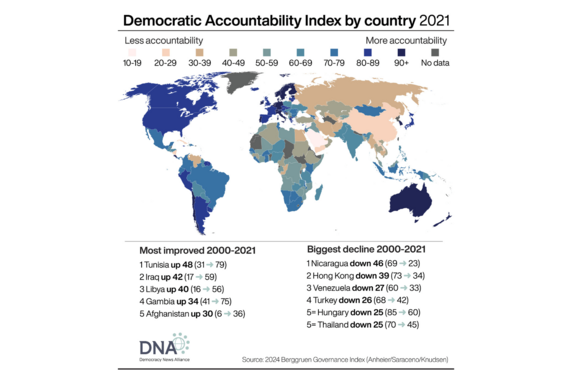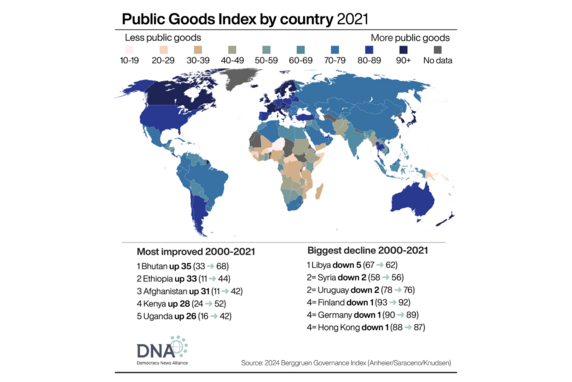
New Berggruen Governance Index shows that democracies guarantee high quality of life, but autocracies are catching up.
Berlin, 16 May 2024. Around the world, democracies are being put to the test. When it comes to basic state services such as good governance and general quality of life, democracies still perform significantly better than autocracies and illiberal regimes. But autocracies have caught up significantly in recent years and are becoming more efficient in providing public goods, according to the 2024 Berggruen Governance Index, jointly compiled by the Hertie School, the UCLA Luskin School of Public Affairs and the Berggruen Institute.
Overall, governance and the quality of life have improved worldwide over the past 20 years. According to the study, African countries have made the greatest strides in raising the quality of life, good governance and democracy; by contrast, on the whole, gains made in Asia have been reversed. While Oceania and Europe have remained stable, in the Americas, the index shows that democratic accountability appears to be worsening.
On the whole, the index shows that democracy continues to be the best guarantee for a high quality of life and good governance. However, the authors see a clear trend: “Even if most autocracies still perform worse in absolute terms, they have narrowed the gap with democracies concerning quality of life. This is a serious danger for democracies, as autocracies are increasingly promoting themselves as an alternative model,” says Helmut Anheier, Senior Professor of Sociology at the Hertie School and Principal Investigator of the study.
The authors of the index identify four country clusters, each with its own pattern of governance performance and common characteristics regarding economy, demographics and political stability:
• Successful democratic states, such as Finland, Denmark, the USA and Germany, look back on several decades of democratic development and generally offer a high standard of living.
• Successful autocratic and illiberal states, such as Turkey or China, offer a very low quality of democracy but have reached higher values in the provision of public goods.
• Struggling states, including Egypt, Nigeria and Venezuela, perform poorly or very poorly in all the dimensions examined. These countries tend to experience lower GDP per capita, a greater likelihood of armed conflict and lower political stability.
• Ineffective states, such as Peru, Tunisia and South Africa, score average in terms of the quality of democracy or governance, but do not do well in the provision of public goods, negatively impacting the quality of democracy and governance in these countries.
For further information and to read the study, see 2024 Berggruen Governance Index.
Contact
Prof. Helmut Anheier
Email: anheier[at]hertie-school[dot]org
Tel.: 030 259 219 113
Background Information
The Berggruen Governance Index is a collaborative project between the UCLA Luskin School of Public Affairs, the Hertie School and the Berggruen Institute. Helmut K. Anheier, Senior Professor of Sociology at the Hertie School, is the Principal Investigator of the index. The 2024 Berggruen Governance Index examines the performance of 145 countries in key areas over a 21-year period to advance our understanding of why some countries are better managed and enjoy a higher quality of life than others. To this end, the index analyses the relationship between democratic accountability, state capacity, and the provision of goods to serve public needs.
The Hertie School in Berlin prepares exceptional students for leadership positions in government, business and civil society. The school offers master’s programmes, executive education and doctoral programmes, distinguished by interdisciplinary and practice-oriented teaching, as well as outstand-ing research. Its extensive international network positions it as an ambassador of good governance, characterised by public debate and engagement. The school was founded in 2004 by the Hertie Foundation, which remains its major funder. The Hertie School is accredited by the state and the German Science Council. www.hertie-school.org
Press contact
Benjamin Stappenbeck
Director of Communications, Hertie School
Email: pressoffice[at]hertie-school[dot]org
Tel.: +49 (0)30 259 219 113
The Hertie School is not responsible for any content linked or referred to from these pages. Views expressed by the author/interviewee may not necessarily reflect the views and values of the Hertie School.


